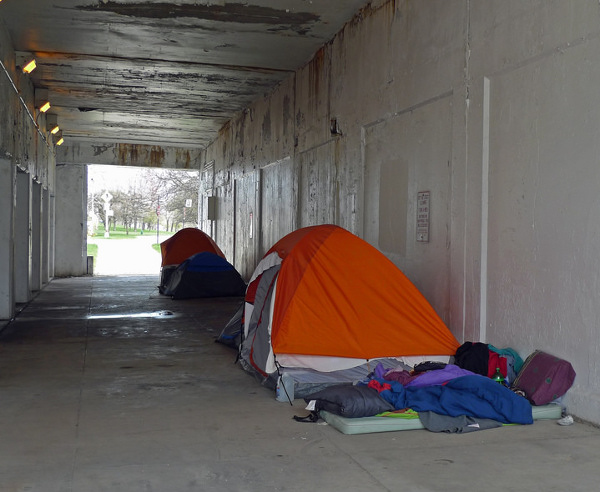
PHOTO/CURTIS LOCKE
Editor’s Note: This article is from a sermon by Rev. Bruce Ray, Pastor, Kimball Ave. Church, Chicago, Illinois
CHICAGO, IL — These days, you don’t have to look far to find tents. Tent cities have popped up across the country—the homes of the displaced and the homeless. I pass an encampment beneath the expressway overpass three blocks from my home almost every day. Dozens of men and women have constructed tents from blankets and tarps to keep out the cold and wind of Chicago winters. No one should have to live in makeshift tents under the constant roar of traffic. These people need the privacy, security and protection that only a permanent house can provide. While some of us may exchange our house for a tent temporarily and enjoy “roughing it” on occasion, in the end we long for the “comforts of home.” These men and women deserve nothing less.
Recently, I ran across a Biblical story found in 2 Samuel 7:1-7 that ends with a surprise. David, King of Israel, had settled down in his cedar (i.e., : luxurious) palace in Jerusalem. He brought in a trusted advisor, Nathan, and revealed that he was bothered that God was still living in a tent and proposed building God a house. Ever since the days of wilderness wandering, God had “lived” in a tent (also known as the Tabernacle). Even after the people settled down in the Promised Land, God remained in the tent. Initially, Nathan encouraged David to proceed with his building campaign, but during the night (here’s the surprise ending) God revealed that God didn’t want to settle down in a house. God preferred living in a tent.
So why would God choose a tent when God could have a house? I believe God is reminding us that God cannot be domesticated, contained, or “placed.” A movable tent is a theological statement about how God ‘lives and moves’ among us. And (another surprise!) when God dwells among us, God encamps with those who have been shoved to the curb. God dwells with the “dis-placed” and the oppressed and the afflicted. God relocates far from the seats of power and wealth in order to locate with and empower the poor and the outcasts. God occupies at the margins.
When I pass the tents of those who are displaced, I am reminded that God has chosen to dwell among them. And I believe it is where God’s people are to pitch their own tents. We are to be on the move with God, occupying the places where there is pain and suffering—where there is injustice and oppression. It is among these tents that we will meet God face to face. It is among these tents that we will hear God’s voice, reminding us to seek the justice that leads to peaceful habitations. It is among these tents that we will learn to seek the “kingdom of heaven” where everyone is welcomed and everyone’s place is restored.
God lives in a tent
Latest
Free to republish but please credit the People's Tribune. Visit us at www.peoplestribune.org, email peoplestribune@gmail.com
The People’s Tribune brings you articles written by individuals or organizations, along with our own reporting. Bylined articles reflect the views of the authors. Unsigned articles reflect the views of the editorial board. Please credit the source when sharing: ©2024 peoplestribune.org. Please donate to help us keep bringing you voices of the movement. Click here. We’re all volunteer, no paid staff.

